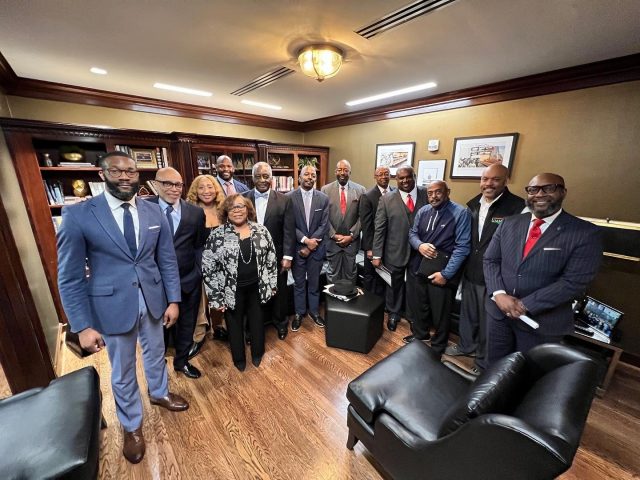
Birmingham city officials, including Mayor Randall Woodfin, far left, join an African American team of developers set to bring an estimated $100 million worth of economic impact and investment in Birmingham. (City of Birmingham)
By Ryan Michaels
The Birmingham Times
An African American team of developers is set to transform 222 acres of land near Lakeshore Parkway into an estimated 900 residential units, single family, multi-family and senior housing with a project that has an estimated cost of $100 million.
The Birmingham City Council on Tuesday agreement unanimously approved the deal for Green Meadow Apartments, LLC., to buy the land for $1.5 million and begin a multi-phased development.
The project includes a planned commercial center with a grocery store, retail and commercial office spaces. This is the largest transaction led by African Americans in the city’s history.
“This is a great day for the city of Birmingham,” said Mayor Randall Woodfin. “Not only because of the jobs, the homes, and the economic impact, but because of the history that is being made.”
Cornell Wesley, director of the mayor’s office of innovation and economic opportunity, called the project “transformational.”
“We are looking at what I believe to be the largest, potentially, economic impact led by African Americans in our storied history as a city, that bring over $100 million worth of economic impact and investment in our area,” he said.
Michael German, CEO of Green Meadow and former director of the Alabama field office for the U.S. Department of Housing and Urban Development (HUD), said, “We’re looking at the redevelopment, reimagining this whole new community that exists and bringing in all the facets of housing and business that will make this grow and will provide tax relief for the city because we’ll be contributing.”
The land is off Lakeshore Parkway at 1911 Tiger Walk in the Oxmoor neighborhood and adjacent to the Jefferson County Industrial Authority. Preliminary studies suggest the project will also generate 240 permanent jobs and another 2,000 construction jobs, in addition $500,000 in property taxes in the first three years, according to the city.